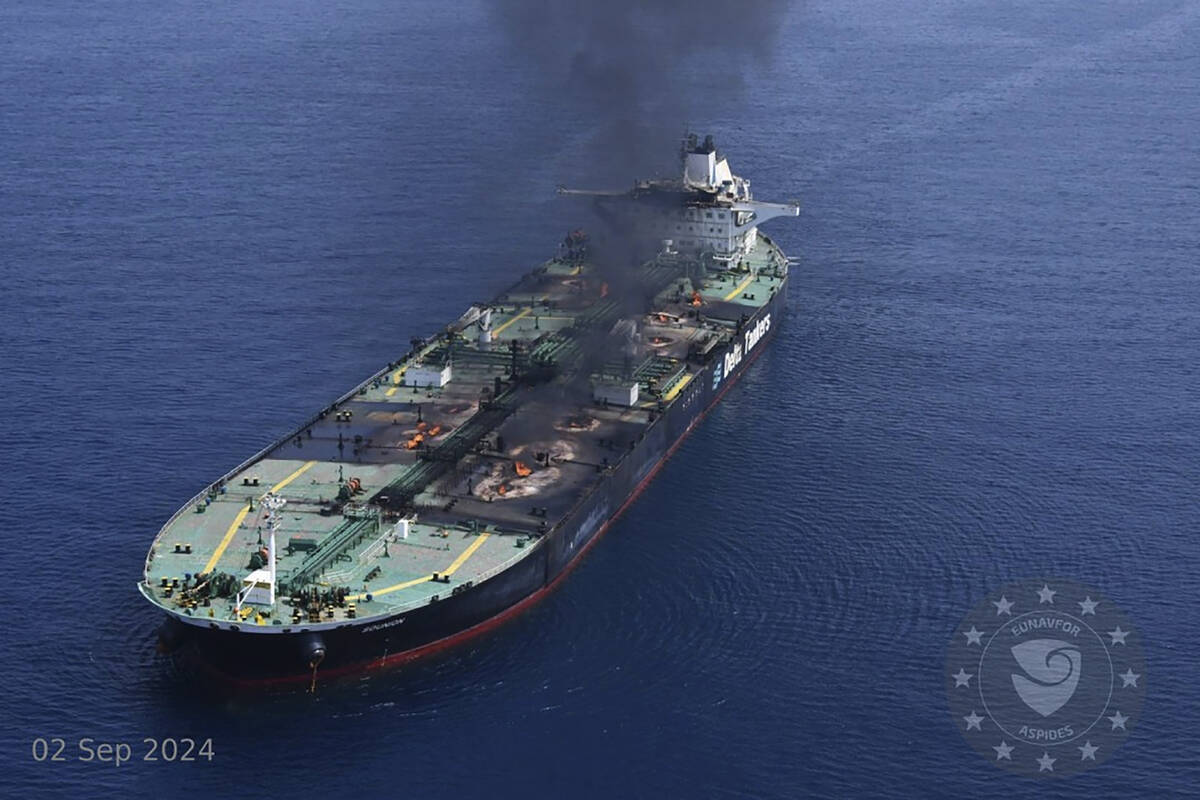Salvagers abandon effort to tow oil tanker hit by Houthi terrorists in Red Sea

DUBAI, United Arab Emirates — Salvagers abandoned an effort to tow away a burning oil tanker in the Red Sea targeted by Yemen’s Houthi terrorists as it “was not safe to proceed,” a European Union naval mission said Tuesday, leaving the Sounion stranded and its 1 million barrels of oil at risk of spilling.
While a major spill has yet to occur, the incident threatens to become one of the worst yet in the Iranian-backed terrorists’ campaign that has disrupted the $1 trillion in goods that pass through the Red Sea each year over the Israel-Hamas war in the Gaza Strip. It also has halted some aid shipments to conflict-ravaged Sudan and Yemen.
“The private companies responsible for the salvage operation have concluded that the conditions were not met to conduct the towing operation and that it was not safe to proceed,” the EU’s Operation Aspides mission said, without elaborating. “Alternative solutions are now being explored by the private companies.”
The EU mission did not respond to questions from The Associated Press about the announcement. The safety issue could be from the fire still burning aboard the vessel. NASA fire satellites detected a blaze in the area the Sounion was anchored in Tuesday.
The U.S. State Department has warned a spill from the Sounion could be “four times the size of the Exxon Valdez disaster” in 1989 off Alaska.
Meanwhile, there’s the threat of attacks by the Houthis, who on Monday targeted two other oil tankers traveling through the Red Sea. The Houthis have suggested they’ll allow a salvage operation to take place, but critics say the terrorists have used the threat of an environmental disaster previously involving another oil tanker off Yemen to extract concessions from the international community.
The Houthis initially attacked the Greek-flagged Sounion tanker on Aug. 21 with small arms fire, projectiles and a drone boat. A French destroyer operating as part of Operation Aspides rescued its crew of 25 Filipinos and Russians, as well as four private security personnel, after they abandoned the vessel and took them to nearby Djibouti.
Last week, the Houthis released footage showing they planted explosives on board the Sounion and ignited them in a propaganda video, something the terrorists have done before in their campaign.
The Houthis have targeted more than 80 merchant vessels with missiles and drones since the war in Gaza started in October. They seized one vessel and sank two in the campaign that has also killed four sailors. Other missiles and drones have either been intercepted by a U.S.-led coalition in the Red Sea or failed to reach their targets, which have included Western military vessels as well.
The terrorists maintain that they target ships linked to Israel, the U.S. or the U.K. to force an end to Israel’s campaign against Hamas in Gaza. However, many of the ships attacked have little or no connection to the conflict, including some bound for Iran.
There are no American vessels known to be in the Red Sea at the moment as the EU mission has taken charge after the Sounion attack. A U.S. defense official, who spoke to the AP on condition of anonymity to discuss information not made public, said the American military has not been asked and has no role in the cleanup or the towing of the Sounion.
The USS Dwight D. Eisenhower recently served a monthslong deployment in the Red Sea, facing the most intense, continuous combat the U.S. Navy has been seen since World War II while fighting against the Houthis.
Two U.S. aircraft carriers, the USS Theodore Roosevelt and the USS Abraham Lincoln, along with their carrier groups, are in the Gulf of Oman to counter a threatened Iranian retaliation against Israel over the assassination of Hamas leader Ismail Haniyeh in Tehran.
The Houthis’ attacks likely will continue until there’s a cease-fire in Gaza, warned Matthew Bey, a senior analyst at the RANE Group, a risk consultancy. Even then, there’s a risk that the terrorists continue the attacks.
“The Houthis have learned quite a bit from what they’ve been doing over the last year — it’s been a very significant recruiting boon for them,” Bey told the AP. “I think there are a lot of incentives for them to target shipping in the future because they’ve learned that they can be very successful in that. It brings in the West, which is kind of the enemy that they want to fight to some degree as well.”